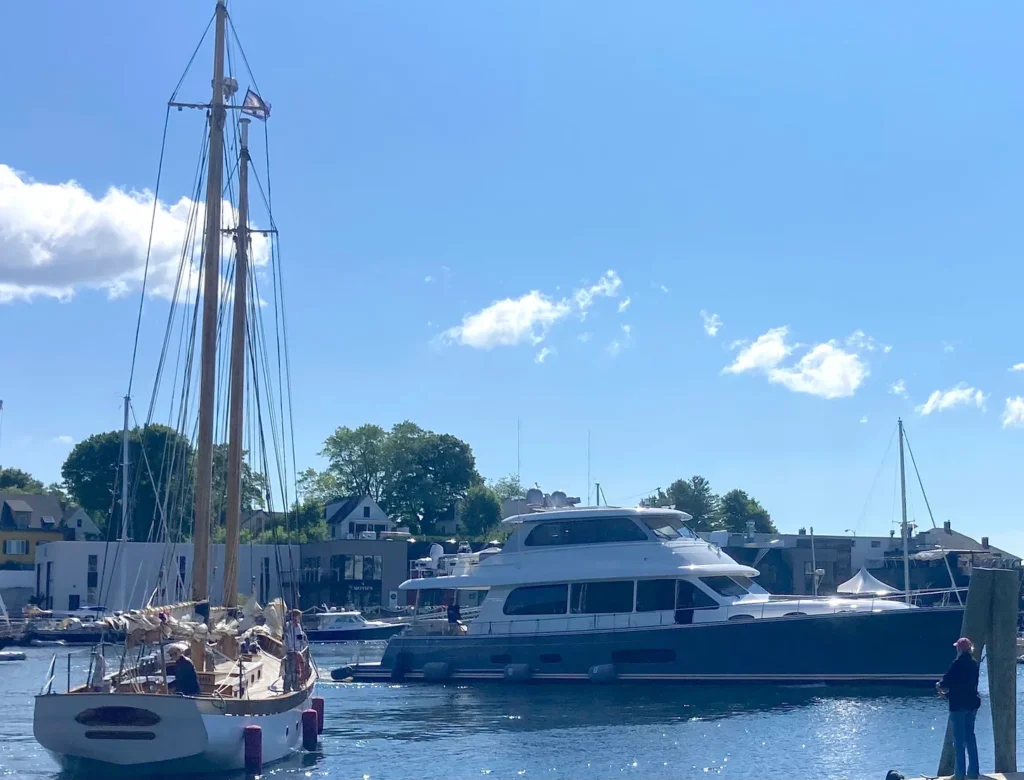“Now we are the guilty ones, the ones causing climate change, those of us who turn on the lights and drive our cars and use our things made of the energy of ancient sunlight…We are guilty, yes. And that means we can feel remorse and make restitution. We now need to move quickly to avoid something far worse. Yet here we are sleepwalking, like doomed Lady Macbeth, toward and unbearable future with hands that will never be clean again.” —Kate Marvel, Human Nature: Nine Ways to Feel About Our Changing Planet, p. 71
Shimmering sunshine, cerulean blue, clear skies on the backside of a cold front. “Whose to care where the cold front went, when it lifted a week of nimbus clear of the Camden Hills?,” the poet Philip Booth wrote it in his poem “Tenants’ Harbor,” one among many of his paeans to the sailors’ life on the coast of Maine. (His poem Chart 1203 evokes the timeless wonders of Penobscot Bay.)
We are blessed to live in this liminal space in a liminal time—it’s not just our salty ocean meeting relentless granite, or fast-moving nimbus clouds chasing away an intolerable heat wave. It’s the shadow of a past time when we believed we knew what we stood for coming hard up against fast-changing cultural trends and seemingly fragile edifices—that we mistook as solid—dropping all around.
It’s living through shimmering summer days and knowing that sea level is rising and our planet is warming faster than ever. As Kate Marvel writes: “After all our warnings, fossil fuels still generate 80% of the world’s energy. The world now uses double the amount of fossil fuels it did when Exxon first began its program of climate research, ignored the results, and covered it all up. This is history: scientists discovered things, companies lied, and the world heated up.” (p 44, Human Nature)
And yet.
Here we are: granite-strong, raspberries ripening, blueberries coming along, too.
Our communities, our local ecosystems, are also thriving, humming. We have civic organizations promoting music, arts, literature. We have nonprofits energized by volunteers working to solve the housing crisis (Midcoast Regional Housing Trust) , tackling our growing food insecurity (AIO, Camden Area Christian Food Pantry, Erikson Farms), and a recognition of the impacts of our changed climate in our daily lives and harbors (Rockport’s Harbor Resilience Project; Camden’s Harbor Resilience Planning).
The point is, we can live a bountiful, productive life, working toward a better way, despite the climate-related devastations that abound and those looming in our future.
And yet. We have choices about that future.
To date our communities haven’t made big strides to reduce our greenhouse gas emissions. Yet it’s the single most important category of climate work we need to be doing. Now.
The good news is we’re embarking on a greenhouse gas reduction initiative for our Midcoast communities. See below.
We’re Hiring—We Need Your Help!
The Town of Rockport is hiring, as part of a collaborative grant—“Climate Action Through Collaboration: Building Resilience in Camden and Rockport”—with the Town of Camden and CamdenCAN.
The RFQ for a Project Manager for a two-year initiative to reduce greenhouse gas emissions via Energy Literacy and a Neighbor-to-Neighbor Energy Coaching project is posted here. Applications are due by 8/5/2025.
We hope you’ll spread the word.
This is from the request:
The Town of Rockport seeks applicants for a contracted Project Manager (“Project Manager”) to support climate change resilience across Camden and Rockport, with a focus on energy resilience and Energy Coaching (Objective 1) and Emergency Preparedness Outreach (Objective 2). This is a two-year contract position managed by the Town of Rockport, funded through a Community Action Grant (CAG) from Maine’s Community Resilience Partnership (CRP) to the towns of Camden and Rockport.
The Project Manager will oversee the day-to-day operations of Energy Coaching, which will involve coordinating with project stakeholders, coaches, and community members, improving and identifying resources/support needed to meet the project plan and timeline, and ongoing tracking and course corrections in collaboration with project stakeholders. The Project Manager will also provide assistance on the Emergency Preparedness Outreach portion of the grant.
And if you’re interested in helping us as a volunteer energy coach, we’ll be setting up trainings in the next few months. Look for more information about those in upcoming newsletters, or email us at camdencan2025@gmail.com.
Other Communities and Their Grants
Maine is blessed to have a proactive Climate Council, and a robust Community Resilience Partnership. As a result, many communities are digging into new climate-related projects, as we are with the Energy Coaching and Emergency Preparedness Grant.
Here’s a quick list of other cool projects being started by our neighbors. You can find the full list here.
- Chebeague-Long Island: A Community Wildfire Protection Plan for the Towns of Chebeague Island and Long Island, Maine
- Little Cranberry Island: Fostering a Future of Sustainability and Resiliency—an Update to Cranberry Isles Comprehensive Plan and Continued Focus on Energy Security
- Cumberland: Reduce Greenhouse Gas Emission of the Town of Cumberland by Increasing Energy Efficiency, Reducing Use of Fossil Fuels, Developing a Local Food Economy, and Enhancing Sequestration from Natural Systems
- Hallowell: Planning for Nature-based Stabilization of Hallowell’s Kennebec River Shoreline—Community Engagement and Design in Support of Policy Development and Implementation
- Hope: Hope Community Sustainability & Resilience Plan
- Isleboro: Community-Driven Nature-Based Solutions for Adaptation of Vulnerable Life-Line Coastal Infrastructure
- Southwest Harbor: Strengthening Southwest Harbor’s Community Resilience, Emergency Preparedness, and Access to Public EV Charging Infrastructure
- Union: Union Severe Weather Infrastructure Risk Management Plan
- Yarmouth-Falmouth: Greater Portland Energy Coaches (GPEC) Program
- Newcastle: Battery Storage Systems for Strengthening Community Resilience and Sustainability in Newcastle
- North Haven: Design and Scoping—Mitigating Saltwater Intrusion Risk in Fresh Pond
- Owls Head: Fire-Fighting Water Supply Ponds with Dry Hydrants
Upcoming Climate Change Events
July 22, Tuesday, 4-5 pm, Camden Public Library, Climate Conversations, sponsored by CamdenCAN. See more here.
July 22, Tuesday, 4:30-6 pm, Brooklin Fire Dept. and via zoom, Energy Technology Innovation Partnership Project. Researchers from National Renewable Energy Labs (NREL) will be visiting public facilities, homes and businesses to better understand Brooklin and its energy landscape. Members of the public are invited to attend a presenation by the NREL researchers at 4:30 PM at the Fire House (behind Town Hall) to learn more about what the ETIPP program means for Brooklin, the BCRC’s energy resilience plans, and ask questions. Representatives from the Island Institute and Versant will also be in attendance.

July 26, Saturday, 5 pm, Carding Brook Farm, Brooklin, Community Potluck Picnic Celebrating Local Food, Sponsored by the Brooklin Climate Response Committee. See more here.
August 8, Friday, 9 am via Zoom. Climate Change and Fast Fashion. Join the Portland and South Portland Sustainability Offices for Coffee and Climate. These (mostly) virtual events are opportunities to discuss topics related to the Cities’ climate action plan, One Climate Future. Register here.
September 5 and 7, Friday and Sunday, CamdenCAN Food Garden Tour. See more and to register (event is free) here.
Concluding Thoughts
We live in challenging times. Not just for humans, but the entire planet.
Pope Leo has succinctly reminded us that the world needs to change its mindset about the planet and what is causing “the world to burn”:
“We must pray for the conversion of so many people, inside and out of the church, who still don’t recognize the urgency of caring for our common home.”
We’re proud to share this Midcoast home with you. We hope you share our concern about the dire need to cut greenhouse gas emissions.
In the coming months we’re hoping we can come together as a community and talk about visions for the future of our common home here at the edge to the sea—a home where we reduce emissions, redirecting our future toward resilience and sustainability.
Thanks for being our neighbor.
A Personal Note from the Editor
As many readers will know, my name is Molly Mulhern, and I have been writing and leading CamdenCAN for the two-plus years since our inception. I recently experienced a boatyard accident that put me into an emergency situation with attendant surgery and recovery. I write of this here to say a huge thank you to those of you in this community who stepped up in so many innumberable ways, to help.
I have learned first-hand of the huge role we play in each other’s lives: the mutual aid network we are building here is phenomenal. Supplies showed up, meal trains were organized, folks worked together to ensure this newsletter and the work of our group carried on.
None of us can plan for the future, but we can adopt the attitude that we care, and that we each can and do play an important role. I have benefitted from this in these last few weeks, and I write here to say to each and every one of you reading this: Let’s plan to keep pulling together as a community as we face our uncertain future. We have great strength together.
And thank you.

